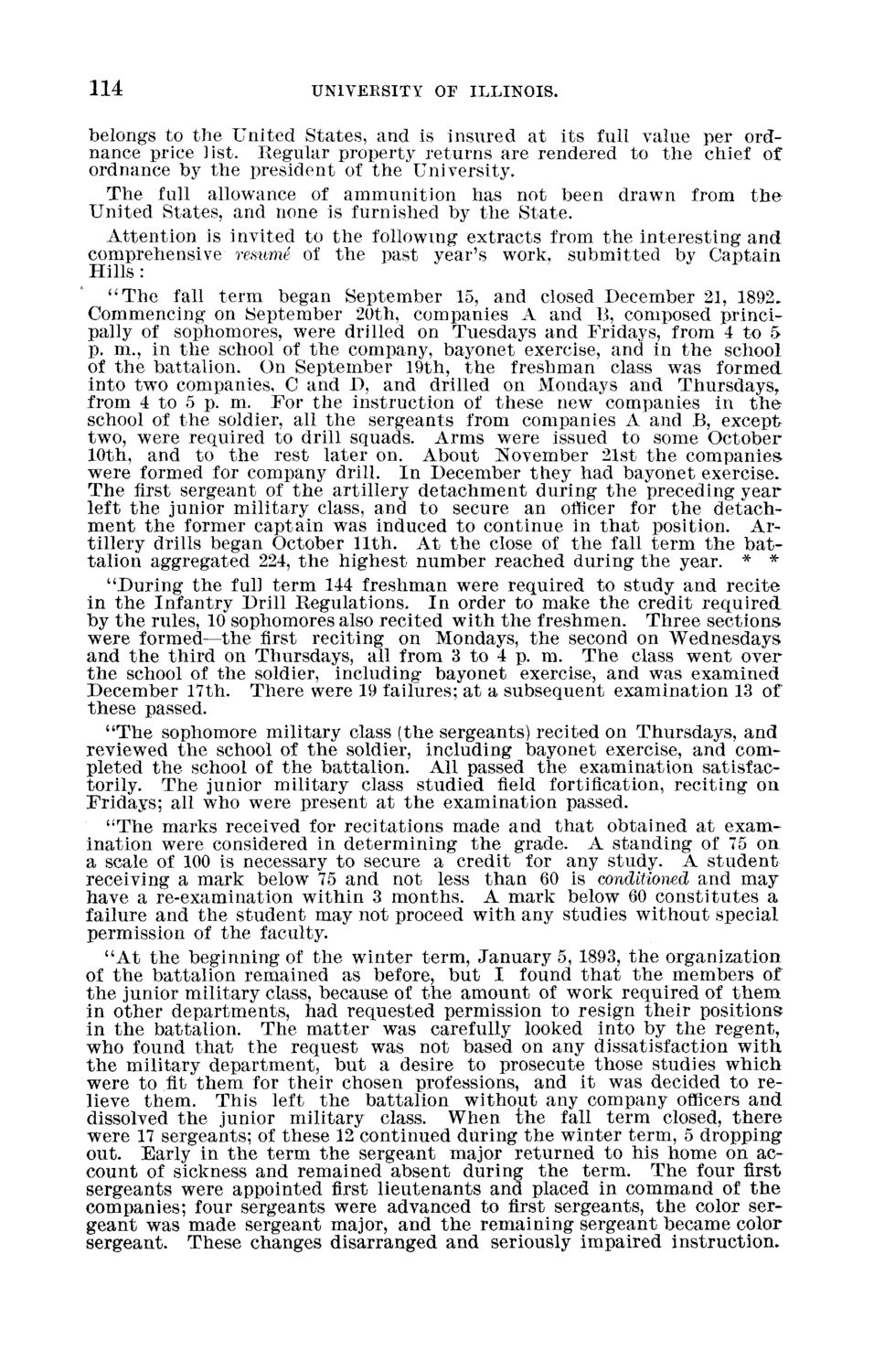| |
| |
Caption: Board of Trustees Minutes - 1894
This is a reduced-resolution page image for fast online browsing.

EXTRACTED TEXT FROM PAGE:
114 UNIVERSITY OF ILLINOIS. belongs to the United States, and is insured at its full value per ordnance price list. Regular property returns are rendered to the chief of ordnance by the president of the University. The full allowance of ammunition has not been drawn from t h e United States, and none is furnished by the State. Attention is invited to the following extracts from the interesting and comprehensive resume of the past year's work, submitted by Captain Hills : " T h e fall term began September 15, and closed December 21, 1892. Commencing on September 20th, companies A and B, composed principally of sophomores, were drilled on Tuesdays and Fridays, from 4 to 5 p. m., in the school of the company, bayonet exercise, and in the school of the battalion. On September 19th, the freshman class was formed into two companies, C and D, and drilled on Mondays and Thursdays, from 4 to 5 p. m. For the instruction of these new companies in t h e school of the soldier, all the sergeants from companies A and B, except two, were required to drill squads. Arms were issued to some October 10th, and to the rest later on. About November 21st the companieswere formed for company drill. I n December they had bayonet exercise. The first sergeant of the artillery detachment during t h e preceding year left the junior military class, and to secure an officer for the detachment the former captain was induced to continue in t h a t position. Artillery drills began October 11th. At t h e close of the fall term the battalion aggregated 224, the highest number reached during the year. * * "During the full term 144 freshman were required to study and recite in the Infantry Drill Regulations. I n order to make the credit required by the rules, 10 sophomores also recited with the freshmen. Three sections, were formed—the first reciting on Mondays, the second on Wednesdays and the third on Thursdays, all from 3 to 4 p. m. The class went over the school of the soldier, including bayonet exercise, and was examined December 17th. There were 19 failures; at a subsequent examination 13 of these passed. "The sophomore military class (the sergeants) recited on Thursdays, and reviewed the school of the soldier, including bayonet exercise, and completed the school of the battalion. All passed the examination satisfactorily. The junior military class studied field fortification, reciting on Fridays; all who were present at the examination passed. "The marks received for recitations made and t h a t obtained at examination were considered in determining the grade. A standing of 75 on a scale of 100 is necessary to secure a credit for any study. A s t u d e n t receiving a mark below 75 and not less than 60 is conditioned and may have a re-examination within 3 months. A mark below 60 constitutes a failure and the student may not proceed with any studies without special permission of the faculty. " A t the beginning of the winter term, January 5, 1893, the organization of the battalion remained as before, but I found t h a t the members of the junior military class, because of t h e amount of work required of t h e m in other departments, had requested permission to resign their positions in the battalion. The matter was carefully looked into by the regent, who found t h a t the request was not based on any dissatisfaction with the military department, but a desire to prosecute those studies which were to fit them for their chosen professions, and it was decided to relieve them. This left the battalion without any company officers and dissolved the junior military class. When the fall term closed, t h e r e were 17 sergeants; of these 12 continued during the winter term, 5 dropping out. Early in the term the sergeant major returned to his home on account of sickness and remained absent during the term. The four first sergeants were appointed first lieutenants and placed in command of t h e companies; four sergeants were advanced to first sergeants, the color sergeant was made sergeant major, and the remaining sergeant became color sergeant. These changes disarranged and seriously impaired instruction.
| |